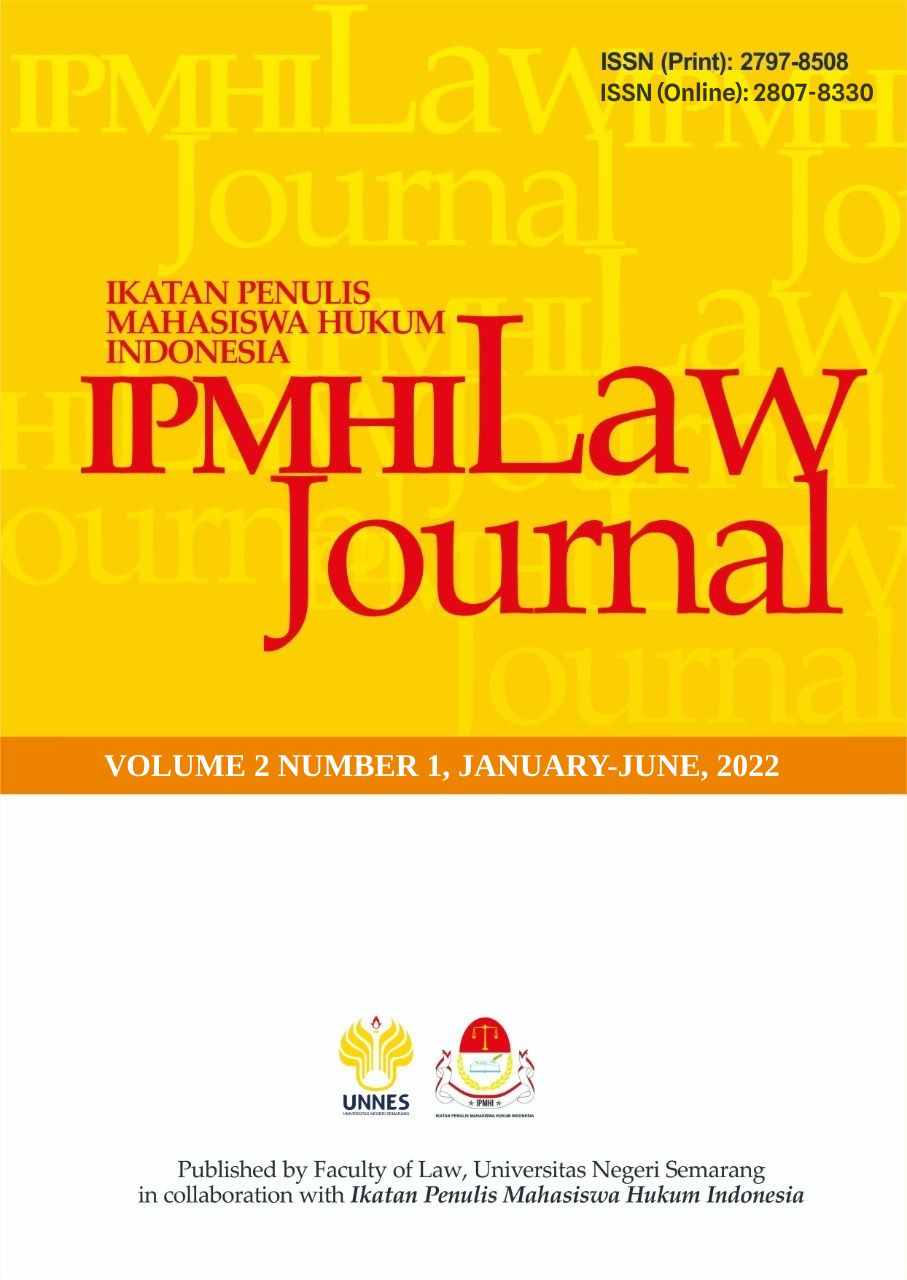Proving the Elements of Fault in the Accountability of the Perpetrator of the Crime of Premeditated Murder Pembuktikan Unsur Kesalahan Pertanggungjawaban Pelaku Tindak Pidana Pembunuhan Berencana
Main Article Content
Abstract
The judicial process without primair evidence of the defendant Jessica Kumala alias Jessica Kumala Wongso alias Jess can be sentenced to criminal punishment by tracing a person's motive for committing a criminal offense that results in the loss of life of another person must be responsible for his actions as regulated by Article 340 of the Criminal Code. Normative juridical research using the deductive thinking method of objects analyzed with a qualitative approach, the research refers to the legal norms contained in the legislation. The basis of consideration of the Panel of Judges in imposing punishment on the defendant of premeditated murder in the First Level Decision Number 777/Pid.B/2016/PN.Jkt.Pst. Judges have the right to accept or override the opinion of expert testimony, but it must be based on appropriate reasons, because in exercising their authority, judges must be truly responsible for the realization of truth and legal certainty. In terms of deciding a case, the judge's belief is very important. This is in accordance with the judge's decision in the Jessica case where the judge has his own view of the case where the judge's instinct is very important. The legal perspective on intentionality that results in the loss of life of others as the author has explained is that intent in criminal law is part of guilt. The intent of the perpetrator has a closer psychological connection to an act (which is prohibited) than negligence (culpa).
Article Details

This work is licensed under a Creative Commons Attribution-NonCommercial-ShareAlike 4.0 International License.
References
CNN Indonesia. “FULL 5: Tuntutan Jaksa ... Berikut Ikhtisar Hasil Rekonstruksi & Keterangan Ahli,” 2016. https://www.youtube.com/watch?v=7SWy30MpAmc.
District Court Decision Number 777/Pid.B/2016/PN.Jkt.Pst.
Eldar, Shachar, dan Elkana Laist. “The Irrelevance of Motive and the Rule of Law.” New Criminal Law Review 20, no. 3 (2017): 433–464. https://doi.org/10.1525/nclr.2017.20.3.433.
Hamzah, Andi. Delik-Delik Tertentu (Speciale Delicten) di Dalam KUHP (Edisi Kedua). Jakarta: Sinar Grafika, 2015.
Hartanto, dan Bambang Sunggono. Metodologi Penelitian Hukum. Jakarta: Rajawali Pers, 2018.
Hiariej, Eddy O.S. Prinsip-Prinsip Hukum Pidana. Yogyakarta: Cahaya Atma Pustaka, 2016.
Hiariej, Edward O.S. “Kritik Merupakan Bukti Cinta Masyarakat Kepada Mahkamah Agung: Motif, Kesengajaan dan Berencana Dalam Hukum Pidana.” Dandapala: Penjaga Keadilan, Vol II/Edisi 3/Juni-Agustus 2016, 2016.
High Court Decision Number 393/Pid/2016/PT.DKI.
Johari, J. “Kebenaran Materil Dalam Kajian Hukum Pidana.” REUSAM: Jurnal Ilmu Hukum 8, no. 2 (2021): 118–127. https://doi.org/10.29103/reusam.v8i2.3811.
Marentek, Junio Imanuel. “Pertanggungjawaban Pidana Pelaku Tindak Pidana Pembunuhan Berencana Ditinjau dari Pasal 340 KUHP.” Lex Crimen 8, no. 11 (2019): 88–95. https://ejournal.unsrat.ac.id/index.php/lexcrimen/article/view/27953.
Nugroho, Bastianto. “Peranan Alat Bukti Dalam Perkara Pidana Dalam Putusan Hakim Menurut KUHAP.” Yuridika 32, no. 1 (2017): 17–36. https://doi.org/10.20473/ydk.v32i1.4780.
Pieter, Salvadoris, dan Erni Dwita Silambi. “Pembuktian Dalam Tindak Pidana Pembunuhan Berencana Ditinjau dari Kitab Udang-Undang Hukum Pidana.” Jurnal Restorative Justice 3, no. 1 (2019): 75–91. https://doi.org/10.35724/jrj.v3i1.1940.
Pratiwi, Siswantari. “Delik Penyertaan Dalam Kitab Undang-Undang Hukum Pidana (KUHP).” Binamulia Hukum 11, no. 1 (2023): 69–80. https://doi.org/10.37893/jbh.v11i1.307.
Soekanto, Soerjono. Pengantar Penelitian Hukum. Cet. 2. Jakarta: UI Press, 2019.
Soekanto, Soerjono, dan Sri Mamudji. Penelitian Hukum Normatif: Suatu Tinjauan Singkat. Jakarta: RajaGrafindo Persada, 2012.
Subekti, R. Hukum Pembuktian. Jakarta: Pradnya Paramita, 2010.
The Law Number 1 of 1946 concerning Criminal Law Regulations.
The Law Number 8 of 1981 concerning Criminal Procedure.
